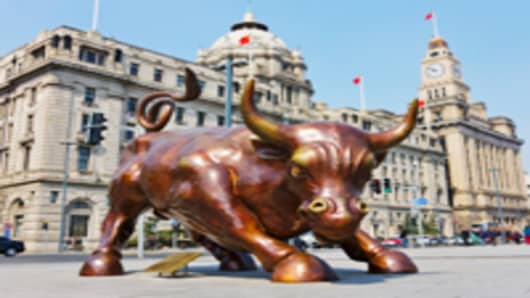As market euphoria begins to wane over the Federal Reserve’s latest stimulus, investors are now forced to confront growing worries about China, whose powerhouse economy appears increasingly vulnerable to a dreaded “hard landing” scenario some have long warned about.
Dour figures and warnings from major companies have raised growing concerns about the world’s second-largest economy. The developments mark a stark turnabout from just a few years ago, when its ability to weather the fallout from the 2008 crisis made China the envy of most G7 economies.
Until recently, most investors have been fixated on the woeful state of affairs in the U.S. and the euro zone, where the European Central Bank unfurled its answer to the Fed’s massive quantitative easing to staunch a debt crisis that threatens to rend the 17-nation currency bloc asunder. (Read more: ECB Bond Buying Likened to Work of the Devil.)
Now, a raft of negative data is dogging what some observers called “the leading dragon” of the global economy. It's calling into question whether China can save the global economy with outperforming growth.
China economic travails are due primarily to factors outside its control. The synchronized slowdown in both US and Europe has dragged the dragon’s economy into a vortex, making China more cautious with its policy levers.
“It’s primarily external with this slowdown in some of china’s biggest market …putting a damper on China’s export growth,” said James A. Dorn, vice president for academic affairs at the Libertarian Cato Institute and an expert on China’s economy. “They’re still a country that depends on exports.”
Its economy is getting blasted by a double barrel of softening domestic demand and weakening foreign investment. Increasing those woes are a growing war of words between Beijing and Japan that threatens to spill over into financial markets.
Speaking to CNBC's “Squawk on the Street”Thursday, prominent hedge fund titan Jim Chanos harshly branded China a “roach motel” that routinely inflates economic data as a figleaf to mask domestic and economic worries that run deeper than most investors suspect. (Read more: China's a 'Roach Motel'; Don't Trust the Numbers: Chanos.)
Markets fell on Thursday’s news that the country’s manufacturing activity rose only marginally in September, with the sector still mired in recession. That followed data showing that foreign direct investment in China fell in August for the third consecutive month.
Meanwhile, multinational US companies are feeling the chill of the ill winds blowing across the Chinese economy. Earlier this week, FedEx lowered its profit targets for next year, citing weak growth in the global economy overall and China in particular. Elsewhere, internet search juggernaut Google said it would close a music download service in the country next month, after the platform fell short of achieving the market impact it hoped to find.
Over the last decade, China has averaged growth of 11 percent, accounting for nearly 10 percent of the world's growth. That has benefited manufacturers like Caterpillar ,which over the same ten year period has seen its stock surge fourfold on equipment sales to Asia's largest economy.
Beijing has pledged economic growth this year will meet a 7.5 percent. Still, some market observers expect China's growth to sink below 7 percent, a psychological barrier that would have serious implications for the world's economy. A slowdown could bleed into emerging markets that have thrived on the back of a surging Chinese economy. (Read more:China Appears More Competitive Than US: Dalio.)
"Our baseline is that China will slow to 6.5 percent to 7 percent,"Pimco's Mohamed El-Erian told CNBC's "Squawk Box" on Friday, adding that emerging market indicators "are pricing in lower growth" in China.
Cato's Dorn still believes Beijing can deliver on growth above 7 percent. However, he warns of trouble ahead. Loose monetary policy in both the U.S. and euro zone may put pressure on China to do the same by loosening the reserve requirement ratio (RRR) for its lenders – something it can ill-afford as it battles rising prices. (Read more: Tight Liquidity, Looming Data Prompt Talk of More China Easing.)


